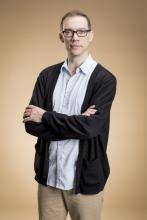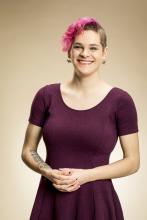We are thrilled to announce that three students from the University of Washington English Department have been selected to the elite club of 2017 Husky 100 Award recipients. Husky 100 recipients demonstrate active application of classroom training to better our campus and their communities. The University celebrates the passion and excellence these future leaders bring to campus. The English Department commends our Husky 100 recipients! Click on their names below to view profiles on the Husky 100 website.

In addition to studying how people with different language backgrounds best acquire academic skills in English, Bergstrom has taken his research to the people themselves: “I … listen to different people talk about the writing and reading they do in all the different languages they use. If we really want to recognize everyone’s linguistic and cultural resources, then we need to find a way to do it on their terms, or at least something closer to their terms. This is the main reason why I work at the Odegaard Writing and Research Center (OWRC) and coordinate its Targeted Learning Communities program for multilingual writers. People in a one-on-one tutoring session or in an informal small group situation talk about the reading and writing they do in ways that are very different from how they talk in a classroom or in teacher-student conference.”
“None of the work that I’m doing now would be possible without the guidance and encouragement that I’ve received from Priti Sandhu, the chair of my doctoral committee; Anis Bawarshi, who first got me interested in the ideas of rhetorical genre and transfer; and Misty Anne Winzenreid, the director of the OWRC, who gave me the chance to coordinate the Targeted Learning Communities program at the writing center.”

Ness’ passion for the written word has also led her to discover a most rewarding job on campus, writing for the UW Daily newspaper. “I started as a copy editor at the UW newspaper in September, and I truly believe I have found a career that I could live with very happily. Ever since I took Beginning Creative Writing in my sophomore year, I have known that I love helping people tell their stories. The Daily’s editorial room is a fast-paced, enthusiastic environment filled with people who care deeply about integrity and are dedicated to reporting ethical, honest stories.”

Since then, Perez de la Rosa has made narrative journalism the focus of his career. “Though I have no ambition to become a fiction writer or a poet, it is thanks to everything that I've learned through the English department and the creative writing program that my journalistic narratives are effective and poignant; while reporting and journalism is the best tool for discovery and exploration of the world, being a great storyteller is paramount in bringing that world to readers.”